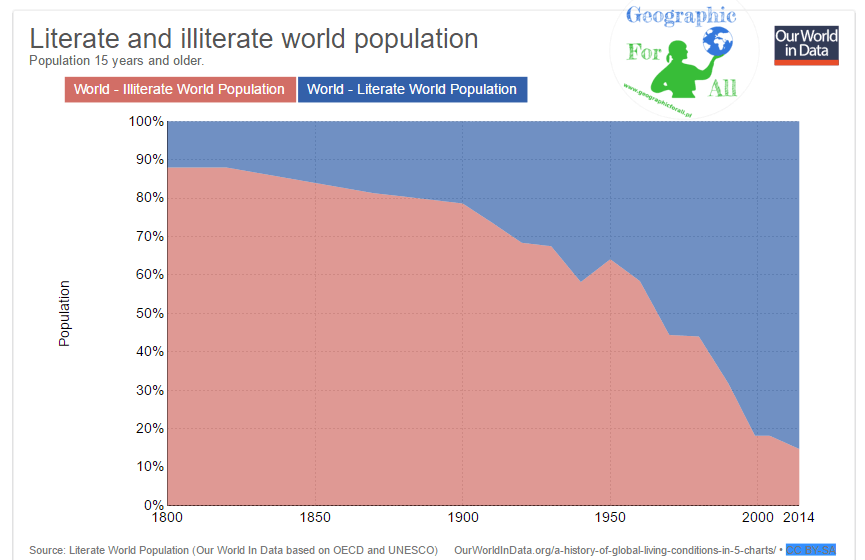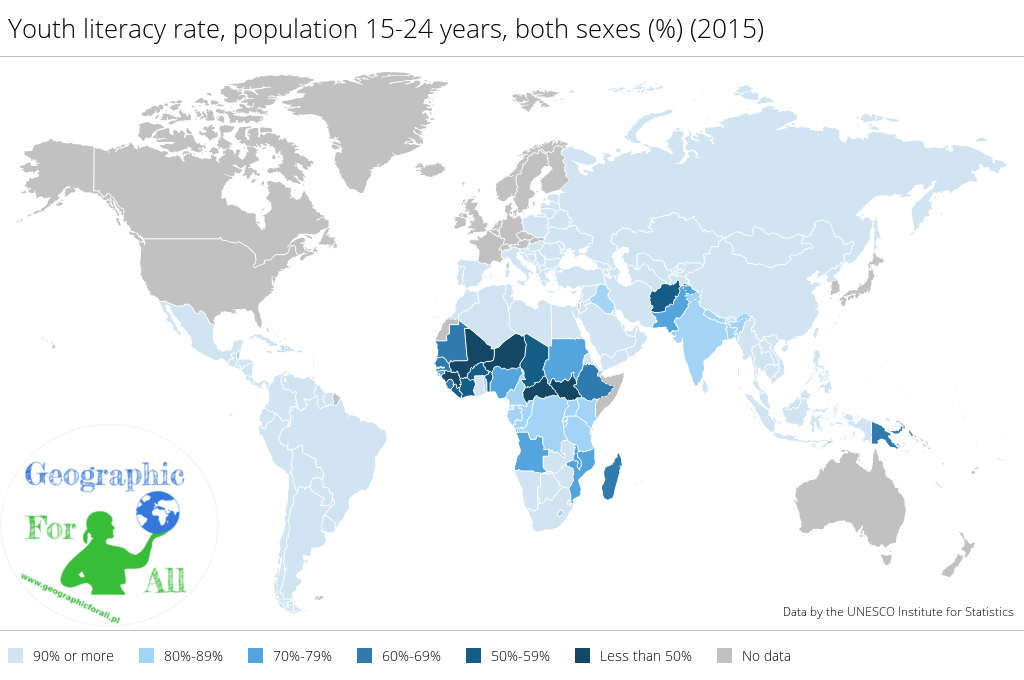For most, if not all, the ability to read, write and perform basic mathematical calculations is something natural, obvious and unconscious. This has not always been the case, but we have had difficult years of learning letters. However, there are still places in the world where young people and adults (according to statistics over 15 years of age) can not read the newspaper.
Confusing statistics of illiteracy
Each country has different criteria for recognizing a person as illiterate. In one, you can not do anything, others take into account the lack or low education (up to 4 classes of primary school). Therefore, even someone who has completed university studies may be considered uneducated in statistics if the country does not recognize his diploma.
What percentage of the world’s population has problems with the written word (2011-5)?
- world – 14-16%; ok. 758 000 000-781 000 000 people
- Europe and Central Asia – 0-1%
- East Asia – 5%
- southern and western Asia – 37%
- Latin America – 8%
- Sub-Saharan Africa – 41%
- Arabia – 23%
Even worse, about 60-65% are women ( source ).
Over the centuries, the situation has been improving all the time: in 1800 88% of the population could not read, a hundred years later 79%, in 1940 – 58%, after World War II 64%, in 1980 only 44%, and in 2000 only 18 %. However, if you look at every 5-6 people in the world must use the help of others in reading.

source: https://ourworldindata.org/literacy/
If you are curious about the exact historical data (1975-2015) for the whole world and individual countries, UNESCO has prepared interactive map and charts . I will mention the worst-case countries (2015):
- 73% Niger
- 64% Central African Republic
- 56% South Sudan
- 55% Guinea
- 51% Mali
- 50% Ivory Coast
- 47% Benin
- 47% Burkina Faso
- 47% Chad
- 46% Liberia
More detailed data is available in report for the period 1985-2015 . Another interesting place is Global Education Monitor , where you can compare not only countries but also to confront the level of illiteracy with religion, gender, wealth, etc.

Map source: UNESCO
Reasons for illiteracy
The level of illiteracy is recognized as one of the determinants of prosperity in the state. Especially in Third World countries, it is best seen why the percentage of people who cannot read is so high.
- poverty – children go to work instead of school
- cultural or religious beliefs
- limiting access to education for girls
- parents consider education a waste of time
- the view that schooling is not useful in life
- no access to education – when the school network is not too dense or the state’s expenditure on education is too small
- too many students in the classroom – the problem of large cities, reduces the quality of teaching
Functional illiteracy
Sometimes the problem is not only ignorance of letters, but also difficulty understanding the text. Then we talk about functional illiteracy. There is also secondary illiteracy when unused skills are forgotten. Mathematical literacy occurs when calculations such as the rest in a store become problematic. Do you think the problem is not about you because you live in Europe? Nothing could be more wrong.
Every two years, since 2000, the OECD (Organization for Economic Cooperation and Development) has been organizing worldwide PISA research in three areas: reading comprehension, mathematics and nature. In 2012, about 510,000 wrote tests. (out of 28 million) 15-year-olds in 65 countries, including 4607 Poles from 184 schools.
In the forefront of the Earth (reading) are the countries of the Far East (Japan, Shanghai and Hong Kong, Singapore and South Korea), but in Europe, Poland is leading together with Finland and Ireland. Which does not mean that Poles are so great: in 2000 people who could not cope in social situations there were 23% in Poland (!!!), in 2012 only 10% (! still an average of 3 people per class). For comparison, Bulgaria and Romania (35-40%), Slovakia (27%), Sweden, Greece, Luxembourg, Lithuania and Slovenia (20-23%) have the most functional illiterates in this study. ( source – full report from 2012 for Poland) .
If you want to read more about it, I recommend Ewa Przybylska’s book from the Nicolaus Copernicus University in 2014 „Functional literacy of adults as a social, existential and pedagogical problem .” It is a comprehensive interdisciplinary compendium with various statistics, although I must admit that it is rather „hard” literature, not Potter for the pillow 🙂
Features
- Lack of literacy has been internationally classified as a disease with the designation Z55.0.
- UNESCO also announced on September 8 International Day to Fight Illiteracy.
Learning to read, especially in childhood, is relatively easy, but preventing the degradation of this skill requires more effort. To paraphrase the golden advice for young drivers „to drive you to have to drive”, „ to read you have to read „.
A statistical Pole read zero books in 2015 (source: National Library report ). This is what 2/3 of respondents declared. Normal (3-6 books per year for working adults) or faster had 19%, including only 2% reading more than 24 items.
And how do you fall on this background? What book have you recently read (readings not counted)?


0 Comments for “Illiteracy in the world”